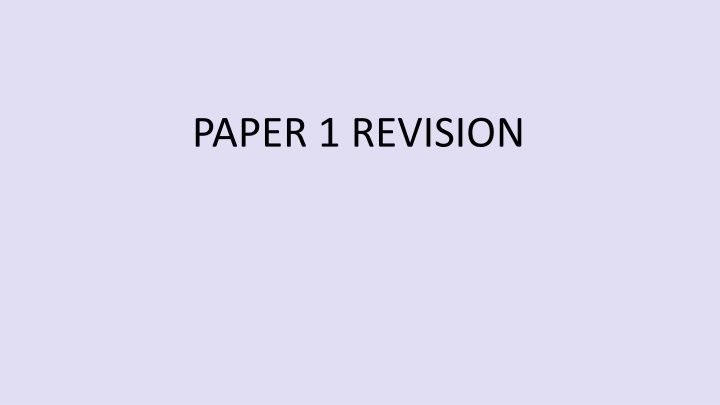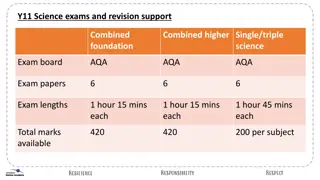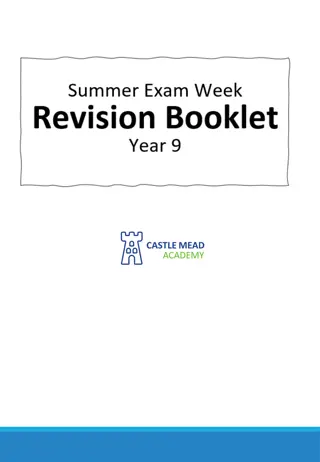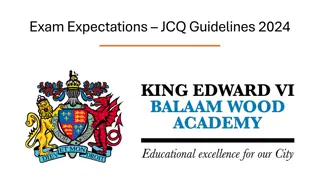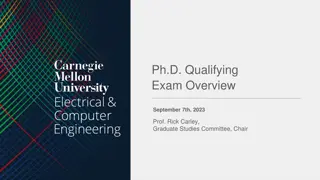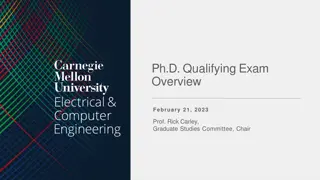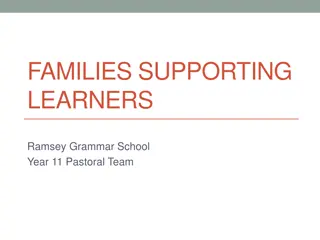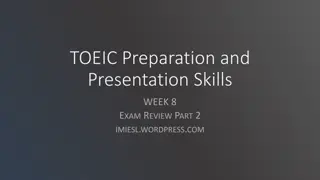Comprehensive Education Revision Overview for Exam Preparation
Delve into a detailed overview of education topics including exam structures, theories, relationships, gender, ethnicity, and social policy. Explore sample questions for both 10-mark and 30-mark scenarios, with guidance on applying material and evaluating perspectives. Additionally, familiarize yourself with methods in context and the exam structure, covering various research methods and issues. Gain insights into prominent educational viewpoints from Functionalist, Marxist, Illich, Althusser, Bourdieu, and more, offering a well-rounded understanding of educational concepts and critiques.
Uploaded on Oct 06, 2024 | 4 Views
Download Presentation

Please find below an Image/Link to download the presentation.
The content on the website is provided AS IS for your information and personal use only. It may not be sold, licensed, or shared on other websites without obtaining consent from the author.If you encounter any issues during the download, it is possible that the publisher has removed the file from their server.
You are allowed to download the files provided on this website for personal or commercial use, subject to the condition that they are used lawfully. All files are the property of their respective owners.
The content on the website is provided AS IS for your information and personal use only. It may not be sold, licensed, or shared on other websites without obtaining consent from the author.
E N D
Presentation Transcript
Education Overview Topics: 1. Exam Structure: Theories of education Functionalism, Marxism, New Right Relationships & Processes: Labelling, Self-fulfilling Prophecy, Identities, Halo Effect, Ideal Pupil Class: material factors, cultural factors, internal factors, compensatory education Gender: Why do girls do better? Why do boys do worse? Subject choice, Feminism Ethnicity: Cultural factors (language, parental attitudes), Material factors, Internal factors (school racism) Social Policy: Globalisation, private/public schools, marketisation and privatisation. 2. 4 mark: Outline 2 reasons 6 mark: Outline 3 reasons 10 mark: Applying material from Item A... 30 mark: Applying material from Item B, evaluate . 30 mark: Applying material from Item B, evaluate . 3. 4. 5. 6.
Education 10 mark Questions Applying material from Item A, analyse two .. reasons/effects/factors/changes...... EG: Applying material from Item A, analyse two factors outised schools that contirbute to working-class underachievement. Advice: Spend about 15 minutes on this question No need for an introduction Use 2 points from the item quote from the item
Education 30 mark Questions Applying material from Item B and your own knowledge, evaluate .. EG: Applying material from Item B and your own knowledge, evaluate the Marxist views of the role of the education system Advice: Spend about 45 minutes on this question 5/6 PERC paragraphs make sure you have strong analysis and evaluation throughout your answer Come to an appropriate conclusion
Methods in Context & Methods Exam Structure: 20 mark Methods in context Question 10 mark: Methods & Theory question Methods: Experiments Questionnaires Interviews Observations Secondary Sources Issues:
EDUCATION 30 MARKS
Main Function is Maintaining Social Stability- Functionalist View (AO2) Main function of education is Outline Marxist View (AO1) Illich: Introduction 1. . 2. . Althusser: 3. . 4. . Bowles and Gintis: Outline and evaluate the view that the main function of the education system is to reproduce and legitimise social inequalities (30) Bourdieu: Criticisms of Functionalism Willis: Criticisms of Marxist View (AO2) Conclusion Other Views
Outline Marxist View (AO1) Freire: Functionalist View (AO1) Main function of education is: Introduction Althusser Bowles and Gintis: Outline and evaluate the view that the main function of the education system is to socialise individuals into societies shared culture (30) Bourdieu: Willis: Criticisms of Functionalism Marxists believe that society is unfair; nowhere more so than education. The values passed on are those of the ruling class Feminists believe that education passes on male values. The belief that if you try hard you can succeed is a lie; this is backed up by the wealthy who inherit more wealth from their families. Education doesn t really teach you much at all in terms of skills needed for jobs; you learn most skills on the job Education is not a natural sieve, which selects people based on talents/ability; ethnicity and social class decides where people go- this is anything but natural. Education isn t an equal environment Criticisms of Marxist View (AO2) There is a lack of detailed research in schools and it is based on little solid evidence. Schools are not always repressive institutions Sometimes behaviour issues can mean that students overcome repressive discipline Elements of the formal curriculum are not designed to create an unquestioning or well skilled workforce. They tend to be deterministic they assume that people do not have enough control over their own education. Often working class students do well. B&G: lack of correspondence between formal and hidden curriculum B&G: Growth of humanities based subjects Conclusion
Yes, is the result of in school processes No, isn t the result of in school processes, other things: Class Introduction Outline issues that affect education briefly (e.g. can be in school factors or outside school such as class, gender and ethnicity) Use item Labelling & SFP and Jacobson) Halo Effect Pivotal Identity: Waterhouse Subcultures: Willis; Rosenthal and Jacobson; Jackson Evaluate the view that differences in educational achievement between social groups are the result of factors and processes within schools. (30) Streaming/Setting: Beechside Comprehensive & Triage: Gillborn and Youdell Direct Evaluation Woods: Range of responses and adaptions, not just one. (e.g. colonization, intransigence) They are too deterministic Problematic studies They do not pay enough attention to factors outside of the school They do not pay attention to the distribution of power in society They recognise the importance of what happens inside schools Most work by interactionists cannot be generalised. Gender Conclusion Ethnicity
Material Deprivation is more important Introduction Cultural factors Vs. Material Factors Cultural factors play bigger part of material? (ATBQ) Cultural Factors Language: Parental Attitudes/Expectations: Douglas (1964 Assess the importance of cultural factors in causing social class differences in educational achievement. (30) Cultural Capital: Criticisms of Cultural Factors Criticisms of Bernstein: Labov- WC Speech isn t inferior Bernstein: school has a role in working class underachievement. Keddie criticises cultural deprivation for victim blaming approaches. She argues that WC culture is different, not inferior. The same can be applied to language codes. Compensatory education policy overcomes material deprivation Such as: Ignoring the Role that the schools themselves play: Schools do not simply process children whose attitudes and ambitions are pre formed in the family- they play an active role in formulating these. Also Ethnicity or LABELLING Overlooking practical difficulties and lack of self confidence: Many working class parents are concerned and ambitious for their children s success. Conclusion Douglas claimed that parental influence was the most influential factor Exaggeration: They tend to exaggerate the differences and downplay the similarities between attitudes and beliefs of the working classes.
Cultural Deprivation Cultural Factors Material Deprivation Waldfogal and Washbook- Cooper and Stewart Low income, diet, health, resources Selection by Mortgage Toys, books, resources, educational visits University entrance Immediate gratification Introduction Cultural factors Vs. Material Factors Cultural factors play bigger part of material? Assess the importance of material factors in causing social class differences in educational achievement. (30) BUT Criticisms of Cultural Factors Evaluation of Material Compensatory education overcomes material deprivation EMA Compensatory education overcomes material deprivation - Pupil Premium EAZs - Such as: BUT - BUT Effectiveness of this? Many schemes have been scrapped. New Right thinkers believe compensatory education is pointless M.Phillips: Teachers are quick to blame poverty, it is poor teaching and poor parenting which are to blame Direct Criticisms - Is it material or cultural factors which play a big part? Point to a criticism of material deprivation - - Direct Criticisms The working class are being realistic not fatalistic. Rather than not valuing education, they may have no choice but to ask their children to leave school as they need more money for the family. In School Factors play a bigger part Also Ethnicity or LABELLING:
Material Explanations terial Deprivation Criticisms of Cultural Factors Criticisms of Bernstein: Labov- WC Speech isn t inferior Bernstein: school has a role in working class underachievement. Keddie criticises cultural deprivation for victim blaming approaches. She argues that WC culture is different, not inferior. The same can be applied to language codes. Ignoring the Role that the schools themselves play: Schools do not simply process children whose attitudes and ambitions are pre formed in the family- they play an active role in formulating these. Overlooking practical difficulties and lack of self confidence: Many working class parents are concerned and ambitious for their children s success. Introduction Suggest the fact that there are different reasons for underachievement of social classes which can be material or cultural are the explanations offered any good? Waldfogal and Washbook- Cooper and Stewart Low income, diet, health, resources Selection by Mortgage Toys, books, resources, educational visits Outline and Evaluate sociological explanations for social class inequalities in educational achievement (30) University entrance Immediate gratification Evaluation of Material Compensatory education overcomes material deprivation Such as: BUT Cultural Factors Language: Parental Attitudes/Expectations: Cultural Capital: Power Et al. Conclusion are the explanations offered any good? Suggest a problem Direct Criticisms In School Factors play a bigger part
Other things have caused Gender differences Girls: Introduction Changes in Wider Society Girls: Boys: Outline and evaluate the claim that gender differences in educational achievement are primarily the result of changes in wider society (30) Boys: Things haven t changed for girls: Still sexism/patriarchy existing in schools: Conclusion Wider society or other reasons?
Evaluations of Gender and subject choice Girls do better evaluation: Introduction Gender and Subject Choice issues Girls do better because: Boys do worse evaluation: Outline and evaluate sociological explanations of gender differences in achievement and in subject choice (30) Boys do worse because: Subject choice evaluation: Researchers have not paid enough attention to gender and patriarchy: Subject choice differences exist because: Conclusion
Sociological explanations for why some EM groups underachieve Direct Evaluation Family Life/Expectations: Introduction Racism: Many sociological explanations for ethnic underachievement Language: Curriculum: Efforts have been made to overcome Language: ethnocentric curriculum Outline and evaluate sociological explanations for why some ethnic minority groups underachieve (30) Racism: Teacher labelling is too deterministic Parental Expectations: Material Deprivation: . Sewell says that Black households tend to have less male role models and parts of black culture have been influenced by the macho Internal explanations also ignore the impact of racism in wider society Curriculum Conclusion Material Deprivation: - Mention the class and gender dynamic Importance of Racism (Mirza) Some ethnic groups achieve highly: Chinese & Indian History is white;
Material factors EM groups more likely to be in the poorest 1/5 of the population (2/5 of EM live in poverty in 2013); of all Bangladeshi and Pakistani live in poorer households; 1/3 of all afro-Caribbeans; These groups are more likely to live in poverty and areas with social problems; 3x higher concentration of FSM amongst these groups; Likely to suffer from poor quality housing, overcrowding and unemployment, just like working class explanations (see class mind maps). Gillborn & Mirza: Issue is very complex. Social class doesn t always override ethnicity. Students from same ethnic background (e.g. middle class) may have different levels of attainment. For example black and Pakistani students perform poorly compared with white British who are outperformed by Chinese students Cultural Factors Introduction Mention that probably multi factorial Define cultural/material Mention that some achieve highly- Chinese/Indian Family Life: Some underachieve due to single parent households and lack of parental interest in education Language: 18% of pupils in primary/13% in secondary do not speak English as a first language. 1 in 9 schools- the majority of students don t speak English as a 1st language. These pupils often have lower levels of attainment.; differences cause difficulties in schoolwork; middle-class teachers may mistake the lack of English spoken at home for low ability.; Used of heavily accented English may be penalised by white middle class teachers. There is active discouragement of the use of mother tongue. Direct Evaluation Language In School factors Racism DfES (2013): those who spoke English as a second language (ESOL) actually outperform native speakers. (AO2); Swann Report says little influence of ESOL Outline and evaluate the view that cultural factors primarily lead to the underachievement of some ethnic minority groups (30) Family Life Swann Report: there are a small amount of actively racist teachers, but even more promote unintentional racism.; Green: Teachers give more praise and help to white children, than black.; Bhatti: looked at student perceptions of teacher s racist behaviour. Found that teacher behaviour included ignoring/not helping students from some racial groups, unfair punishments and unfair telling offs Bhatti (1999): Pakistani and Bangladeshi parents show a good deal of interest in children s education (AO2). However, they didn t know much about the education system, so failed to help their children. Black Caribbean parents often have a good level of interest I children s education (AO2), but high levels of lone parenthood inhibited help due to practical issues. Black girls often see single mothers as sources of inspiration, therefore, they have higher levels of attainment than boys. Vincent (2011): black middle-class parents actively concerned with children s education, making their children attend extracurricular activities and making meetings with teachers (AO2). However, parents often found that teachers treat them as if they know little about their children s education. Patel et al. (2010) High levels of interest amongst black parents (AO2). Moon et al (2004) found that 82% of EM parents attend parents evening (AO2). However, Bangladeshi and Pakistani parents are less confident to help with homework. This is due to lack of CULTURAL CAPITAL. Modhood (2006): parental interest suggests main reason why EM pupils are likely to go to university, even more so than white counterparts. 24% of EM children are likely to go to university (AO2) Curriculum: The curriculum and hidden curriculum only take into account white culture, and other cultures are marginalised.; History is white; religious education focuses on Christianity; European languages are taught. Textbooks often victimise or marginalise ethnic groups and art, literature, music, history and culture of black people is marginalised and tokenised; Dress codes (for PE, for example) may come into conflict with other cultures (i.e. modesty culture); Ethnocentrism leads to low-self- esteem of EM children, making the curriculum more acceptable to some EM culture than others. Conclusion Mention that probably multi factorial Mention that some achieve highly- Chinese/Indian Some Achieve Highly Swann Report suggests that some from Indian/Asian & Chinese backgrounds have higher levels of parental support, higher expectations and close knit families.
Differences down to other things: 1. Ethnicity - Racism: Gillborn/Strand/Swann Report - Ethnocentric Curriculum 2. Class - Material deprivation: Waldfogal and Washbrook - Cultural Deprivation: See et al; West & Hind; Language: Bernstein 3. In school - Labelling: Rosenthal and Jacobson 4. Gender - Girls have greater expectations: Sue Sharpe - Changes in job market (Mac an Ghail) Introduction Suggest that policies have at times divided although some have aimed to reduce inequality It is down to other things on the whole, however, such as (pick one ) Policies which have led to differences in achievement Marketization benefits the MC (League Tables, OFSTED, Academies, competition); selective schooling- 1988+ Triage/league tables- 2010+ Tripartite policy benefitted MC with grammar schools and WC left behind- 1944 Vocationalism reproduced labour of the WC reducing life changes and mobility- 1979 - - - Outline and evaluate the view that differences in achievement amongst social groups are the result of social policies (30) - Some policies aim to reduce differences in achievement between social groups: Compensatory education: EMA, EAZs, Excellence in Cities, More Money for Schools, Changes to admissions codes (2010), Pupil Premium, FSM; recent policies have aimed to reduce exclusion Comprehensivisation 1965 GIST/WISE Conclusion Suggest that policies have at times divided although some have aimed to reduce inequality It is down to other things on the whole, however, such as (pick one )
Marketization hasnt benefitted social groups- has excluded them - Marketization benefits the MC (League Tables, OFSTED, Academies, competition); selective schooling- 1988+ - Triage/league tables- 2010+ - WC go to worse schools - Cultural deprivation of WC (Douglas) means that they cannot make the same sort of choice that MC can - COVERT SELECTION: schools under marketization make efforts to exclude working class Green et al. Bookes et al. - Bourdieu (CULTURAL CAPITAL) Other policies have aimed to reduce exclusion Compensatory education: EMA, EAZs, Excellence in Cities, More Money for Schools, Changes to admissions codes (2010), Pupil Premium, FSM; recent policies have aimed to reduce exclusion Criticism: Phillips rejects the benefit of compensatory education (not down to material deprivation when talking about underachievement) Marketization has benefitted all- raising standards Standards driven up if competition is present. Formula funding benefits all as schools compete to get as many students as possible- raises standards for all. They may attempt to support particularly the working class (changes to admissions code gives PP priority, 2010) League tables aim to create a market (who is best etc.)- all schools improve standards for all. Academies and Free schools increase choice on the market to appeal to all pupils Introduction Outline and evaluate the view that the marketization of education has not benefitted all social groups equally (30) Problems with marketization policies League tables for privileged choosers and have a deplorable name and shame attitude Marketization doesn t stop selection by mortgage in practice Marketization becomes motivated by profit and saving money (academy chains) Formula funding money per head may not be spent fairly on WC Conclusion
Reduce social exclusion policies 1997: More Money for schools EMA EAZs/EICs GIST/WISE 2010 Pupil Premium Changes to admissions codes Create an educational market Introduction ATBQ Mention that policies can have many aims; central theme has been reducing exclusion Policies which have created an educational market 1988: Independence of schools Formula Funding National Curriculum OFSTED League Tables 1997 Academies 2010 Free Schools Outline and evaluate the claim that the main aim of education policies in the last 30 years has been to reduce social exclusion (30) Direct Evaluation Evaluation Policies of marketization has increased social exclusion; covert selection; issues with league tables. Academies increase exclusion- they practice covert selection. Brooks and Green Cultural capital - Policies have been reduced/erased or challenged/failed Conclusion ATBQ Mention that policies can have many aims; central theme has been reducing exclusion Some believe that marketization has increased opportunities (formula funding) - Policies which reduce exclusions have been a common theme since 1997. -
Class Task Plan an education 30 mark question as a revision aid on an A3 piece of paper
Marxist view: Role of education Functionalist View: Role of education Introduction Evaluate the view that while Marxist and functionalist approaches focus on similar issues, they reach very different conclusions about the role of education . (30 Marks) Evaluation of Marxist view Evaluation of Functionalist view Conclusion
Education Knowledge Organiser
Education Knowledge Organiser Purposes of Education Internal Processes Durkheim (1890s) Education builds social solidarity; passes on shared values. Evaluations (5): - Marxists: ignores class inequalities - Feminists: ignores gender inequalities - Wealth/ privilege is still often inherited society not universalistic - Mismatch between skills and knowledge of school and that required by jobs - Education system is not a neutral sieve not a true meritocracy Functionalists eg Durkheim: the hidden curriculum helps to embed shared norms Evaluation: sociologists can understate the formal curriculum Functionalist Perspectives Hidden Curriculum: informal learning; how a school is organised Parsons (1950s) Education bridges particularistic values (family) and universalistic values (society). Bowles and Gintis (1976) the hidden curriculum teaches students to be obedient workers. Becker (1971) found teachers evaluate pupils in relation to idea of the ideal pupil Evaluation: labelling does not always affect student outcomes student responses and external factors are important too Teacher Labelling: teachers placing labels on pupils according to stereotypes/ judgements Schulz (1971) Education develops human capital (knowledge /skills of workforce) Harvey and Slatin (1971) s study showed white MC children were likely to be identified as good pupils Davis and Moore (1945) Education selects and sifts for best jobs role allocation. Gillborn (2011) ideal pupil stereotype favours white children Althusser (1971): Education reproduces false conscoiusness by acting as an ideological state apparatus passing on ruling class ideology Evaluations (6): - Lack of detailed research in schools (for all but Willis) - Ignores some influences of the formal curriculum eg sociology, developing students critical of society - Too deterministic many working class pupils succeed in education - Overstate the role of school in forming pupil identities - Exaggerate the extent to which schools provide a willing labour force - Feminists: understate patriarchal nature of the education system Marxist perspectives Self-fulfilling prophecy: when a pupil responds to teacher labelling by acting how they are expected to act Rosenthal and Jacobson (1968) s field study identified a randomly selected group of pupils in a California school as spurters as a result, these pupils were treated more favourably by teachers , and ultimately did better academically. Evaluation: see above pupils can rebel against label they are not always negatively affected. Bourdieu (1977) Education legitimizes and reproduces class inequalities, as MC have the advantage of cultural capital. Illich (1995) and Freire (1996) Education represses and oppresses the working class an example of hegemonic control Setting: students divided into subject groups by ability Streaming: students divided into a group for all subjects by ability Educational Triage Ball (1981) s study found that top-set students were warmed up academically whereas lower sets were cooled out, so often left school earlier Evaluation: recognises importance of school organisation but understates external factors eg parents attitudes Bowles and Gintis (1976) Through the hidden curriculum pupils are prepared for work and taught to accept their position. Smyth et al. (2006) found students in lower streams had more negative attitudes towards school. Gillborn and Youdell (2000) A*-C economy mean hopeless cases are given up on Willis (1977) Schools don t always produce obedience anti-school subcultures often exist for working class pupils Pupil Subcultures and responses to labelling: pupils respond to labelling in different ways, and can form subcltures Lacey (1970) schools are differentiated by ability, and students are polarised between good and bad Evaluations: recognises the autonomy of pupils and their responses; but ignores external factors and distribution of power in society Chubb and Moe (1990) Education should not be about equality, just about training workforce. A free market and competition should be in place in education. Evaluations: There is still a mismatch between what is learnt in school and required by jobs; fails to acknowledge inequality in society. New Right perspective Sewell (1998) found a group of black pupils reacted against racist labelling by forming pro-school subculture Willis (1971) found the WC lads he studied in formed an anti-school subculture Emphasis on developing human capital and linked to globalisation. Work experience etc. Evaluation: Work experience ineffective, vocational ed has a low status. Vocational Education
Education Knowledge Organiser Social class, gender and ethnicity Education policy External: Material factors (money) Overcrowded housing; illness; lack of toys and books; part-time jobs; poor schools in poor areas; poor diet;cost of university. Evaluations: doesn t take into account school measures eg FSM and free breakfasts to combat this; doesn t account for attitudes Social class and Education Policy Effect Evaluation Relevance 1944 Education Act (Butler Act) Conservative- led coalition Introduced universal, compulsory secondary education; tripartite system 11+ exam: grammars, secondary moderns, technical schools 11+ inaccurate test; Disadvantaged working class; Crowther Report (1959) talent and ability wasted; Boliver and Swift (2011) no social mobility Selection by ability Equality of opportunity in access to education About 70% of all pupils get 5 A*-C grades at GCSE, compared to around 30% for young people on FSM External: Cultural factors (not money) Douglas (1964) found parental attitudes most important. Gorard, See and Davies (2012) still true. Bernstein (1971) WC use restricted code, not elaborated code of school. Bourdieu (1971) MC kids have more cultural capital and social capital = do better in school (MS habitus) Evaluations: - Reay (2009) these explanations blame the victim - Overlook practical difficulties - Ignore internal processes - Ignore the need for schools to change to be more welcoming - Exaggerate class differences 1965 Conversion to Comprehensi ve schools Labour Largely eradicated tripartite system by inviting LEAs to convert to comprehensive schools; some chose to keep some grammar schools School Admissions Code now forbids schools to select by ability BUT covert or hidden selection still occurs (Tough and Brooks, 2007) Selection by ability Equality of opportunity in access to education (Internal see page 1) 1988 Education Act (Conservative s) Management of school budgets transferred away from local authorities (LEAs) Formula funding introduced Parental choice and open enrolment; National curriculum and testing Less regulation with lack of local authority control Formula funding means less popular schools got less money The myth of parental choice (Ball) Marketisation of education Raising standards External: Sharpe (1976) found girls priorities were love and marriage, but by 1994, careers. Francis (2000) confirmed this. Reasons: - Feminism and equal opportunities. - Girls socialised to work hard - Crisis of masculinity (Ghail, 1994) - Boys socialised to like sports and games Internal - Girls more likely to join pro- school subcultures - Forde et al (2006) boys influenced by peer group pressure - Teacher labelling lower expectations of boys Gender and Education Girls outperform boys at every stage of the education system. More women than men apply to and go to university. New Labour reforms (1997-2010) Free nursery places and sure start centres; Education Action Zones/ Excellence in Cities; Academies; EMA Power and Whitty (2008) compenstaory education benefitted individuals but failed to make a big impact Marketisation of education;Compens atory education Equality of circumstances Subject choice: gender socialization, subject counselling, subject images (Colley, 1998) could affect subject choice. However Gender pay gap still exists; girls experience sexism; social class and ethnicity too External: Material ethnic minoirty families more likely to live in poverty Language differences could impact education Parental support Bhatti (1999) found parents were supportive but lacked knowledge of how to help pupils Internal: Cline et al (2002) lots of racist bullying exists in schools Gillborn and Youdell (200)) found secondary teachers have low expectations and negative stereotypes of black students Ethnocentric curriculum Conservative- led coalition (2010-15) 2010: all schools could convert to academies; Pupil premium; Ebacc, exam and curriculum reform Reduced quality control; myth of parentocracy (Ball); increased pressure on pupils; educational triage/ Marketisation and privatisation of education Ethnicity and Education Chinese and Indian pupils = highest attainers Black Caribbean, Pakistani, Bangladeshi and Roma = lowest Globalisation and Education - Alexander (2012) international comparisons eg PISA have invoked moral panics about the stae of UK education - Policies from elsewhere: mastery approach to maths (Singapore), entry requirements for trainee teachers (Finland) Gender and ethnicity policies - Multicultural education to tackle ethnocentrism of schools, but Troyna and Williams (1986) argue it can be tokenistic - Initiatives such as GIST and WISE encourage girls to pursue careers and degrees in STEM. However, other pervasive factors mean limited success. Swann Report (1985) language has minimal impact; Vincent et al (2011) Black MC parents very supportive Student responses are important eg Sewell s study;schools becoming more diverse
